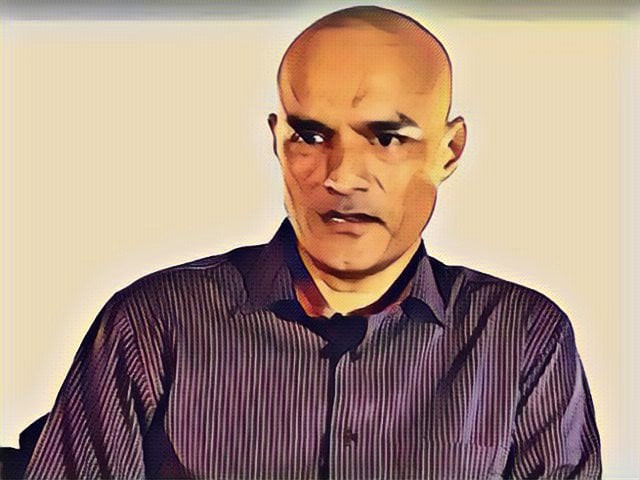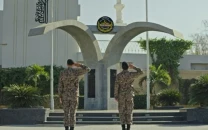Jadhav admits working for RAW during consular access
India claims ‘ex-naval officer parroting Pakistani narrative under duress’

PHOTO: FILE
Jadhav was allowed to meet India Charge d' Affaires in Pakistan Gaurav Ahluwalia, pursuant to the decision of the International Court of Justice (ICJ), which ruled that under the Vienna Convention, Pakistan is bound to give New Delhi consular access to the convicted spy.
“Consular access was provided at 1200 hours and lasted for two (02) hours, in the presence of officials of the Government of Pakistan,” an official statement issued by the Foreign Office said.
“On Indian request, there was no restriction on the language of communication. In order to ensure transparency and in line with standard operating procedures, and as conveyed to the Indian side in advance, the access was recorded,” the statement added.
The statement further noted that as a responsible member of the international community and in line with its international commitments, Pakistan had provided “un-impeded, uninterrupted consular access to India to Commander Jadhav”.
Although no details were shared by the Foreign Office regarding the contents of the two-hour-long meeting, officials familiar with the development said Commander Jadhav stuck to the confessional statement he made on previous occasions before the Pakistani authorities.
Officials said Jadhav informed the Indian envoy that he was working for RAW to carry out ‘subversive activities’ in Pakistan, particularly in Baluchistan.
India’s Ministry of External Affairs did indicate that Jadhav had indeed endorsed Pakistan’s stance but claimed he might have done all this under duress.
“While we await a comprehensive report, it was clear that Shri Jadhav appeared to be under extreme pressure to parrot a false narrative to bolster Pakistan’s untenable claims,” Indian foreign ministry spokesperson Raveesh Kumar said in a statement.
“We will decide a further course of action after receiving a detailed report from our Cd’A and determining the extent of conformity to the ICJ directives,” he added.
He also said the India’s external affairs minister had spoken to the mother of Jadhav and briefed her of the consular access.
“The government remains committed to continuing to work towards ensuring that Shri Jadhav receives justice at the earliest and returns safely to India," Raveesh further said.
It is learned that the Indian government has shortlisted names of some Pakistani lawyers to plead Jadhav’s case.
The Indian naval officer turned RAW agent was arrested on March 2016 in Pakistan’s Balochistan – a region where Islamabad has long accused New Delhi of backing separatist rebels. He was convicted of planning espionage and sabotage and sentenced to death by a military court.
India claimed Jadhav retired from the navy in 2001 and was running a “logistics” business in the Iranian port of Chabahar. New Delhi insists he was taken captive in Iran before being moved to Pakistan and then forced to confess. India then approached the UN court to intervene, saying his trial had been unfair and Pakistan had denied him diplomatic assistance.
Pakistan maintained that a treaty between the neighbours did not oblige it to allow diplomatic assistance for those suspected of being spies or terrorists. The ICJ decision was a favourable outcome for Pakistan as the court did not order the acquittal and release of Jadhav.
The consular access was given despite soaring tensions between Pakistan and India over Prime Minister Narendra Modi’s decision on August 5 to revoke the special status of Indian Occupied Kashmir.
Pakistan has since then downgraded diplomatic ties and suspended bilateral trade with India as well as taken the issue to the UN Security Council.
The decision to grant consular access to Jadhav against the backdrop of Kashmir tensions has come under criticism, particularly on social media.
But officials insisted that the two issues were not interlinked and that Pakistan, following the ICJ decision, was under obligation to provide consular access.
According to officials, the decision would only help Pakistan’s standing at a time when India is brazenly violating the international laws by keeping millions of Kashmiris under locked down for almost a month now.



















COMMENTS
Comments are moderated and generally will be posted if they are on-topic and not abusive.
For more information, please see our Comments FAQ